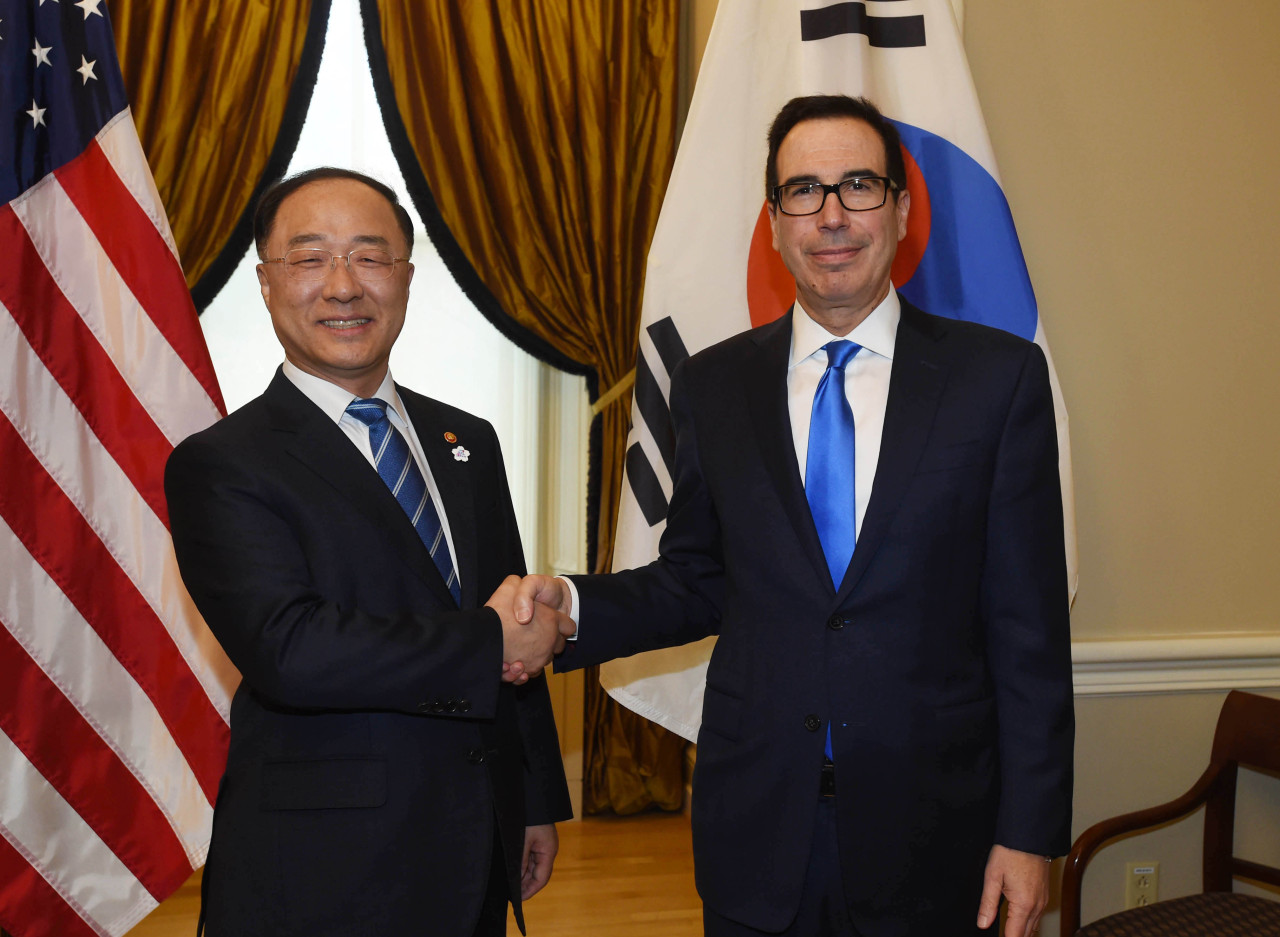US Treasury Secretary Steven Mnuchin has said Washington will fully take into account South Korea's position on possible auto tariffs, South Korea's finance ministry said Friday.
Mnuchin made the remarks in Washington on Thursday (local time) during a meeting with South Korean Finance Minister Hong Nam-ki, who called for an exemption from US tariffs on South Korean automobiles, according to the ministry.
Hong is in Washington for the Group of 20 finance ministers and central bank governors' meeting, as well as meetings of the International Monetary Fund and the World Bank.
Hong's request came about a month before US President Donald Trump decides whether to impose tariffs of up to 25 percent on imported autos and parts for reasons of national security as defined in Section 232 of the Trade Expansion Act.
 |
South Korean Finance Minister Hong Nam-ki (left) and US Treasury Secretary Steven Mnuchin. (Yonhap) |
South Korea has lobbied hard to win an exemption from the tariffs on the grounds that it made concessions on automobiles in the revised bilateral free trade deal that went into effect in January.
South Korea is concerned that it could suffer a considerable setback if the US imposes tariffs on its cars, as the auto industry accounts for 14 percent of production and 12 percent of employment in the country's manufacturing sector.
Wendy Cutler, a former US official who negotiated the original free trade deal with South Korea in 2007, has said it is inconceivable that Trump will rule against South Korea as Seoul has made concessions in the free trade deal and is a strong ally of Washington.
Also Thursday, Hong called for a quick diplomatic resolution of a trade row between South Korea and Japan, saying that Japan's export curbs could disrupt global supply chains for materials and have negative implications for the global economy.
Mnuchin expressed hope that South Korea and Japan can quickly put their economic cooperation back on track.
Last week, South Korea and Japan failed to reach an agreement in their first bilateral talks in Geneva in connection with Seoul's complaint with the World Trade Organization over Tokyo's export restrictions.
The talks are part of a dispute settlement process under WTO rules. The two sides agreed to meet again for additional talks.
In July, Tokyo imposed tighter regulations on exports to Seoul of three materials -- resist, etching gas and fluorinated polyimide -- that are critical for the production of semiconductors and flexible displays.
Japan later removed South Korea from its list of trusted trading partners in retaliation against last year's South Korean Supreme Court rulings ordering Japanese firms to compensate South Korean victims of forced labor during Japan's 1910-45 colonial rule of the Korean Peninsula.
Separately, Mnuchin praised South Korea for its efforts to improve transparency on its foreign exchange policy.
In May, the US Treasury Department kept South Korea on a list of countries to monitor for currency practices but hinted at its possible removal in the next reporting period scheduled for this month.
The Treasury said South Korea met only one of the three criteria for a currency manipulator and could be removed from the monitoring list if it remains so in the next six-month period.
Under a revised set of criteria, a trading partner is labeled a currency manipulator if it has a bilateral trade surplus with the US of at least $20 billion, a current account surplus of at least 2 percent of gross domestic product and "persistent, one-sided intervention" in foreign exchange markets.
In the May report, South Korea met only one condition -- a material current account surplus of 4.7 percent of GDP in 2018.
Hong and Mnuchin also signed the first bilateral memorandum of understanding on infrastructure that calls for, among other things, mutual investment and cooperation in winning joint projects in Latin America and Southeast Asia.
Hong held separate meetings with senior officials from two major global rating agencies -- Standard & Poor's and Fitch Ratings -- and said South Korea will mobilize all policy tools to achieve a 2 percent range of economic growth this year.
The International Monetary Fund on Tuesday lowered its growth forecast for South Korea's economy this year to 2 percent from its previous outlook of 2.6 percent amid a global economic slowdown.
Hong recently told lawmakers in Seoul that South Korea appears unlikely to achieve its 2.4 percent growth target. (Yonhap)








